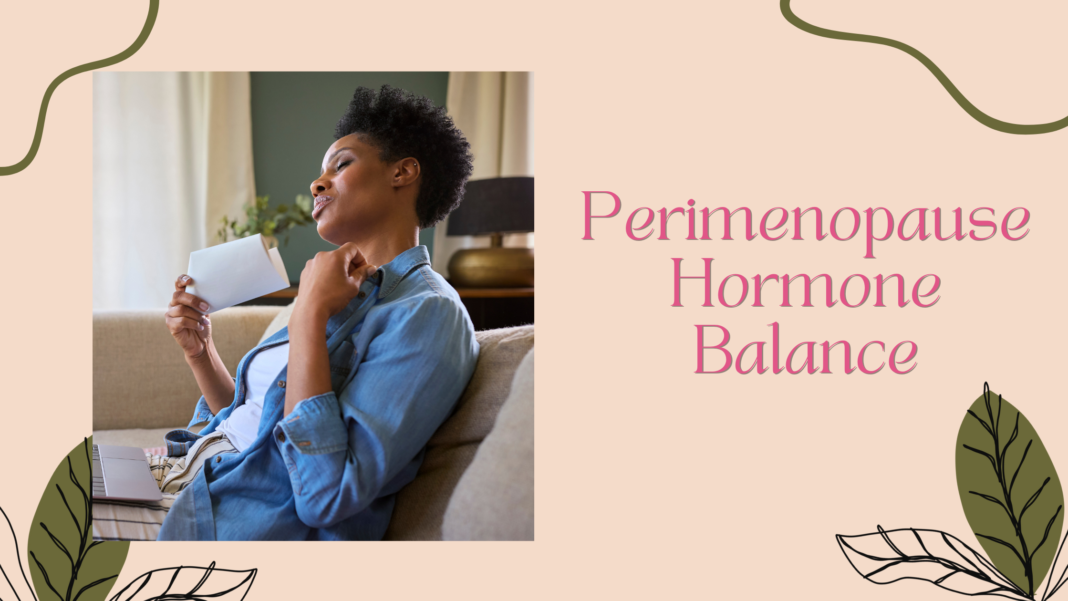Journeys to stabilise hormones in perimenopause should begin with an understanding of how hormones work and why they are shifted in this phase. During perimenopause, fluctuating hormonal phases especially oestrogen and progesterone are ushered in which can lead to these imbalances. This imbalance is responsible for most perimenopausal signs and symptoms, from weight gain to emotional instability.
Fluctuating hormones can be overwhelming, but we have the power to make adjustments to guide our bodies through this transition. Now the answer to the question on how to balance hormones in perimenopause is to combine lifestyle changes, weight loss plan changes, and supplements or treatments to help maintain perimenopause hormone balance.
Prioritising nutrition for perimenopause and hormonal imbalance
One of the best ways to rebalance our hormones during perimenopause is to focus on our weight loss plan. What we consume has a direct effect on how nice our body looks, including hormonal law. A weight reduction plan rich in whole foods, lean protein, healthy fats and fibre helps support top quality hormone levels.
Key vitamins to include:
- Phytoestrogens are compounds found in foods like flaxseed, soy and legumes. They resemble oestrogen in the body and therefore help control fluctuation of hormones.
- Healthy fats come from fish, especially salmon while omega-3 fatty acids can be derived from chia seeds, walnuts or oils (like those in flax). They help reduce inflammation and regulate body temperature.
- Magnesium is essential for adrenal functioning; it keeps blood pressure constant when hormonal changes take too long to settle down.

Exercise: A natural way to balance hormones
When it comes to handling perimenopause and hormone imbalance, physical fitness is vital. Other than that it does help to control weight, avail good sleep patterns as well as making one feel good towards themselves; all these are some of the major effects experienced due to hormonal changes.
What form of exercise is good?
1) Strength training: Building muscle not only increases your metabolism, but it also helps change insulin and cortisol, two hormones associated with weight gain at some point in perimenopause.
2) Yoga and Pilates: These low-impact sports activities reduce stress, improve flexibility and inspire mindfulness, which could undoubtedly have an effect on hormonal stability.
3) Aerobic activities: Walking, swimming, or cycling can help improve cardiovascular fitness, which tends to decline as oestrogen levels drop.
The secret is consistency. We don’t have to spend hours in the gym to get results – finding sports that we enjoy and can stick with will have the biggest impact on our hormone levels.
Stress management and sleep for hormonal health
Stress has an immediate effect on hormonal stability, especially during perimenopause. Elevated levels of cortisol, the primary stem hormone, can interfere with oestrogen and progesterone and worsen perimenopausal signs and symptoms. That’s why stress management is essential.

Effective stress management strategies include:
The key is to pay attention to what our bodies want and make small, sustainable changes that help with long-term health. Our perimenopause adventure doesn’t have to be overwhelming – with the right techniques, we’ll thrive throughout this segment of existence.
a) Mindfulness tactics: Including mindfulness methods like meditation and deep breathing into the daily routine can reduce cortisol levels, thereby helping with hormonal balance.
b) Enough rest: Hormonal changes in perimenopause may cause such sleep disturbances but for hormonal regulation, prioritising rest is essential. Making a schedule for sleeping, cutting down on screen time before going to bed and keeping the temperature of the bedroom low will help sleep better.
Lack of sleep is now not most effective on mood and energy phases, but it additionally increases the danger of weight gain and insulin resistance. Getting enough sleep helps keep our perimenopausal hormones in balance.
Best hormone balancing Supplements for perimenopause
For maintaining hormonal health, a balanced diet plan and healthy lifestyle are important, however, certain supplements can also support both perimenopause and hormonal balance. Before adding any supplements it is essential to consult with your doctor; but these are some commonly supported options:
i) Black Cohosh: Some people who tried using this herb found it helpful treating hormone imbalances, hot flashes and other menopausal disorders.
ii) Maca Root: Maca is among the plants that have healing properties which are capable of controlling hormones while boosting body energy.
iii) Calcium and Vitamin D: These nutrients are essential during dropping levels of oestrogen when they become bones’ enemies.
Good hormone balancing supplements for perimenopause will differ among women, hence it is wise to make a referral from an exercise expert specific to each individual.
Hormone replacement therapy (HRT)
Lifestyle changes and dietary supplements alone may not be enough for some women to deal with severe perimenopausal symptoms. In such cases, the choice would probably be hormone replacement therapy (HRT) as this therapy uses oestrogen or a mix of oestrogen as well as progesterone to replace hormones that the body fails to produce in adequate amounts.
Although it can adequately relieve symptoms like hot flashes or stop bone loss, HRT has its demerits including increased risks of breast cancer and heart disease. Having a candid conversation about whether HRT is suitable for you with your physician is very important. The Mayo Clinic provides excellent resources on the pros and cons of HRT.
Conclusion
Balancing hormones during perimenopause requires a holistic approach that combines vitamins, exercise, weight control and, in some cases, dietary supplements or scientific interventions. By mastering our bodies and making thoughtful adjustments, we can navigate perimenopPerimenopause represents a normal phase in the life of every woman; it mostly starts at around mid-40s or even sooner than that. It indicates the gradual decrease of oestrogen and progesterone hormones whose levels have many effects on the functioning of various organs. During this phase, the frame goes through numerous changes that regularly cause signs and symptoms along with hot flushes, mood swings, abnormal duration and sleep disturbances. The real news is that there are approaches that clearly help stabilise perimenopause hormone imbalance. Let’s explore how we are able to boost our hormones during this time.


